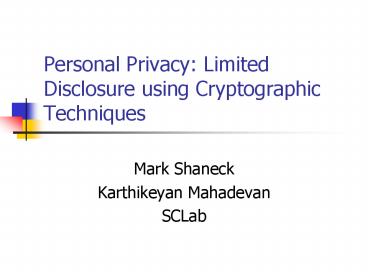Personal Privacy: Limited Disclosure using Cryptographic Techniques - PowerPoint PPT Presentation
1 / 21
Title:
Personal Privacy: Limited Disclosure using Cryptographic Techniques
Description:
Airlines Passenger Information. Medical Databases. Of Course 'Big Brother' is omnipotent ... Electronic Frontier Foundation www.eff.org. Center for ... – PowerPoint PPT presentation
Number of Views:59
Avg rating:3.0/5.0
Title: Personal Privacy: Limited Disclosure using Cryptographic Techniques
1
Personal Privacy Limited Disclosure using
Cryptographic Techniques
- Mark Shaneck
- Karthikeyan Mahadevan
- SCLab
2
What is Privacy
- Privacy is the expectation that confidential
personal information disclosed in a private place
will not be disclosed to third parties, when that
disclosure would cause either embarrassment or
emotional distress to a person of reasonable
sensitivities. - Information is interpreted broadly to include
facts, images (e.g., photographs, videotapes),
and disparaging opinions.
3
Privacy Invasion Grocery Store
- Using a credit card to pay for the groceries
- The credit card information should be used only
for the payment - What you buy should never be revealed to anyone.
- This is a birds eye view of the problem.
Although not serious please visit
http//www.rbs2.com/privacy.htm for more
interesting problems
4
A quotation
- The Home Office caused controversy last year
when it attempted to allow a long list of public
authorities to access records of individuals'
telephone and Internet usage. This
"communications data" -- phone numbers and e-mail
addresses contacted, web sites visited, locations
of mobile phones, etc. -- would have been
available without any judicial oversight, under
the Regulation of Investigatory Powers Act 2000
- London
5
What is Limited Disclosure
- California passed a law, SB 27, requiring
disclosure to consumers of the kinds of
information companies collect and shared about
them. Takes effect from 2005 - As the title suggests we want to limit disclosure
of personal information - In other words I and only I should provide access
to my personal information.
6
Misuse of Personal Information
- On average, 49 of victims did not know how their
information was obtained. - Identity Theft
- 27.3 million Americans have been victims of
identity theft in the last five years - 67 of identity theft victims - more than 6.5
million victims in the last year - report that
existing credit card accounts were misused. - www.idtheftcenter.com
7
Real Life Examples
- Almost 10 months after the World Trade Center
attack, a widow found out that an identity clone
had been living and working using her husband's
information. - He had died during the attack.
- A mother keeps receiving collection notices on
her daughter's credit card accounts. - Her daughter died 17 years ago.
http//www.idtheftcenter.org/vg117.shtml
8
Other Scenarios
- ISP Customer Information
- Airlines Passenger Information
- Medical Databases
- Of Course Big Brother is omnipotent
- Personal Privacy on the Internet is a myth
(http//www.epic.org/reports/surfer-beware.html)
9
Privacy Policy
- Yes there is enough literature, documents and
other resources on Privacy Policy - But how many of us read the privacy agreements?
(Has anyone really read EULA?) - Policies are really like traffic rules, but we
still need a cop to enforce it.
10
Privacy
- KYDs example AIDS website
- P3P (Platform for Privacy Preference)
- Privacy Tools
- http//www.epic.org/privacy/tools.html
- Other resourceful websites
- Electronic Frontier Foundation www.eff.org
- Center for Democracy and Technology www.cdt.org
11
Security in Databases
- Designing databases with privacy as a central
concern Hippocratic Databases - Secure Databases Executing SQL Queries over
Encrypted Databases - Encrypted Keyword Search
- There has a lot of good work done in this area.
12
Why this talk?
- For our project we initially decided that we will
solve one part of the Hippocratic Databases
Limited Disclosure - There is a solution based on P3P for limited
disclosure - Cryptographic Techniques to provide limited
disclosure is the theme of our project
13
Definitions
- Kp Pip to P ki (where P is some system
parameter - length of storage agreement) - Let h be a hash function h0,1 gt
0,1m11 - k0 k
- ki h(ki-1)
14
Limited Disclosure - Setup
- Chooses n pq (p,q large primes) where p
2x1, q 2y1 (x, y large primes) - Chooses e, d, such that ed 1 mod f(n)
- Chooses Kp odd.
- A stores meKP mod n and Kp, n with DB
A
DB
15
Limited Disclosure Scheme
Computes (mrKp)(rKp)-1 mod n
A
B
DB
Computes (meKp)rd mod n
16
What everybody knows
Everything, of course N, p, q, f(n), e, d, k, h
n, rd mod f(n), (rKp)-1 mod f(n)
A
B
DB
c, k, n, rd mod f(n)
17
Limited Disclosure - Key Update
- Every night, DB computes (meKp)kp-1
- A can now give authorization for some time in the
future by computing the proper Kp and Kp-1 - A knows that the data will change, and does not
want to give authorization until after the
change, but wants to give the authorization token
now)
18
Benefits
- A is mostly offline (only needed when giving
authorization, which can be done beforehand) - A keeps DB out of the loop when changing access
control lists - Requires no authorization checking from DB. DB
just responds to all queries with the encrypted
data. - Disables B from checking if cached copy of As
data is still valid (after expiration of
authorization)
19
Lines of Thought
- We think that e is used only by the owner of the
data, can we keep this as a secret ? - Is this scheme secure ?
- Can we use a symmetric key system ?
20
Future Work
- Collaboration attack Can we avoid this ?
- Analyze the protocol for any security breaches
- If possible provide a Proof of security
- Tie this with P3P
21
Questions .. Suggestions ?































